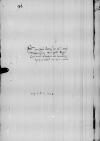Letter #1981
Ioannes DANTISCUS to Tiedemann GIESEHeilsberg (Lidzbark), 1538-11-11
English register:
Dantiscus thanks Giese for the young goats (capreoli) he sent. He would be greatly pleased if Giese came in person to his sister’s [Catharina von Höfen's] wedding, but he accepts his excuse and thanks him for his news.
He informs Giese of the arrival of a messenger from [Samuel] Maciejowski, Dean of Cracow. He brought news of the King’s [Sigismund I Jagiellon’s] good health. Dantiscus has also received news of the Turkish fleet being surrounded by the combined fleets of the Pope [Paul III], the Emperor [Charles V of Habsburg], Venice and [Genoa] under the command of Andrea Doria. Services of supplication for victory are being held in Italy.
Presently, as soon as his own messenger returns from Cracow, Dantiscus will send back Maciejowski’s messenger. Giese can use him to pass on his own correspondence. In Dantiscus’ view, the matters outlined in the letter from the Castellan [Achatius von Zehmen (Cema)] have already been dealt with according to Giese’s advice. Dantiscus’ messenger will most likely bring the relevant royal letter.
Giese will find an exact copy of the oath taken by Dantiscus in his own bull. Just in case, though, Dantiscus will ask advice on the matter from certain bishops of the Kingdom [of Poland].
| received 1538-11-13 Manuscript sources:
Prints:
| ||||||
Text & apparatus & commentary Plain text Text & commentary Text & apparatus
Reverendissimo in Christo Patri et Domino, domino
Reverendissime in Christo Pater et Domine, amice carissime et honorande.
Salutem et solitam amoris commendationem.
Pro capreolis missis multam habeo gratiam. Gratum mihi fuisset plurimum, si commode
Pro novis gratias ago. 1538-11-10⌊Heri1538-11-10⌋ missus ad me a domino decano Cracoviensi
Exemplum iuramenti, quod ego praestiti, Dominatio Vestra Reverendissima in sua habet bulla – contuli enim – convenit in omnibus. Scripturus tamen sum in omnem eventum quibusdam nostris in
Dominationem Vestram Reverendissimam diutissime felicissimeque valere cupio ex animo.
Ex
Reverendissimae Dominationis Vestrae deditissimus frater


 BCz, 245, p. 98
BCz, 245, p. 98